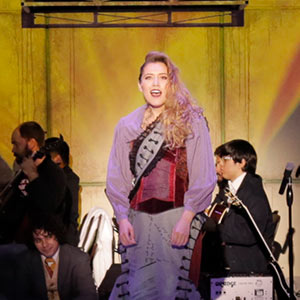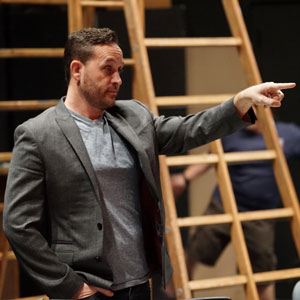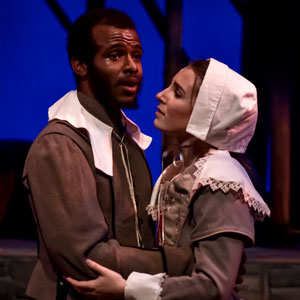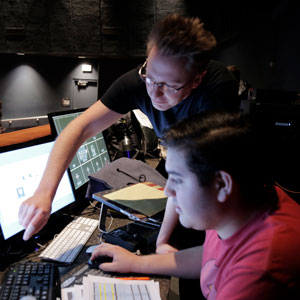Who Put Such Thoughts in Your Head? Ragtime, Fullerton College, Synchronicity & Syncopation
— OC Weekly - Andrew Tonkovich - Sunday, September 8th, 2013This morning finds me riffing, happily, on (at least) two of my favorite subjects, my talented kid and one of my all-time favorite novels. E.L. Doctorow (Edgar to his friends and careful readers) also happens to be a favorite writer, thinker, essayist. As much as I adore Ragtime, which I taught a couple of times to beginning writers over at the community college in the orange grove (except no more orange grove), I would have also dug teaching two or three of his books, including The Book of Daniel and Loon Lake, both offering the same inventive narrative-making, puzzling around, meta-fiction, historical revisionism (natch) and synchronicity. Thirty years after I first read the book, published in 1975, I find even more synchronicity (or something) in the delight of my thespianic young son's small if inspiring role in the upcoming Fullerton College production of the musical version.
Which is to say that synchronicity is indeed today's theme, kids, of the what-goes-around-comes-around perhaps inevitable kind, at just the right moment. (Maybe a cousin of serendipity.) And also the Jungian kind, where events not actually causally related are somehow meaningfully related. Which is what the whole whimsical yet powerful and beautifully, elegantly and subtly arranged legerdemain of Doctorow's bestselling and now "classic American" novel is about, with The Little Boy, a kind of clairvoyant, seeing at least something of the future --- "Warn the Duke!" --- and, more importantly, not only seeing the events of the story but composing them.
So who really is that medium, character, voice, person who "meaningfully relates" the totally, wonderfully, magically contrived events, connections, historical figures, consequences and purposeful coincidences of the story of the wealthy white family living in their "house at the crest of the Broadview Avenue hill in New Rochelle, New York" in the early years of the new century? The author, of course. No, really. The unnamed narrator, sure, who turns out to be The Little Boy, revealed very late in the novel (to the delight of my students) in a first-person POV feint which, when I went to look it up in my completely torn-up, noodled-in, annotated, dog-eared old paperback copy still thrilled me. What a thing, to invite the reader not in just a dumb puzzle of the sci-fi or literary show-off variety but in real historical events, rearranged, mysterious developments, inter-related campaigns and connected struggles and lives that actually matter?
I still haven't seen the film version, despite featuring the gorgeous Elizabeth McGovern as the gorgeous if ridiculous Evelyn Nesbitt, the girl in the swing, lover of architect Stanford White and wife of Harry Thaw, who shot old Stanny. Why not? Because my own perception, experience, vision of the events and characters of the novel are so dear to me. That will change, I guess, as I'd similarly avoided the musical, which I now sort of regret, written by Terrence McNally with lyrics by Lynn Ahrens and music by Steven Flaherty and --- because I promised synchronicity ---arriving at Fullerton College in a month as part of, yes, the college's centennial celebration. Yup, Fullerton College is the oldest California community college in continuous operation, so that, who knows, maybe Tateh, the kismetically-transformed Jewish immigrant and his new wife, maybe drove out to the orange groves one afternoon to see the place?
It's a really, really, really good musical adaptation (more than only an adaptation) and, if you are a fan (or nut, like me) of the novel, you can clearly hear the same pop-culture, musical tempo, comics, movie fragment-makes-whole storytelling. As in the line, "Who put such thoughts in your head?" asked by Mother of, yes, Edgar. By which she means her son but McNally and of course Doctorow mean E.L. and, perhaps, a kind of imaginative possibility person, a collective teller of revisionist tales. Not the Angel of History, no. More like the Angel of America, on its flapping-flying way to some kind of more perfect if impossibly flawed union of social and economic democracies. Who put these ideas in our heads?
And in the musical, written by Terrence McNally, the narrator, The Little Boy, that voice has got a name. Yup, it's Edgar. Perfect, especially if you understand the novel and its ambitions. Remember that its publication in 1975 was as much about recent resistance movements (Women's Liberation, Panthers, anti-Viet Nam War) as about those just building up steam before the First World War. Angela Davis and Ralph Nader, Gloria Steinem, all of em, are healthy, strong shadows of Emma Goldman (real) or Coalhouse Walker, Jr. (fictional), but I didn't need to tell you that. Except that it pleases me so, and readers and, yes, audiences listening to and likely singing along to the musical version, with its amazing introduction of each character, real or imagined by themselves. A perfect welcome by way of point of view, not to mention the relation of each to their destinies.
Sorry if I'm going too fast. Read the novel. There are a whole lot more topics, interpretations, analyses. Just one more, which strikes me on a Sunday morning a hundred years later: "All violence," offered Marshall McLuhan, "is a quest for identity." I often find MM too easy, not to mention sometimes owing a lot to the Situationists without crediting them like maybe he should have. So that Coalhouse's campaign for his rights, dignity, political power (which resonates in so many ways) feels to me like yet another way E.L. was covering the past in a template not only of itself, but of our then-present. And the sex scandal, murder, tabloid underage girl Evelyn Nesbit deal? "...the newspapers called the shooting the crime of the century, but Emma Goldman knew it was only 1906..."
I also love the way the happy synchronicity of a hundred years of public community college education finds itself being celebrated, memorialized in the presentation of this amazing play, directed by veteran local theater genius Gary Krinke, whose past productions have challenged and raised the bar for regional theater. How best to reconcile and connect two worlds, one a century ago, with ours? How better, especially, to look in the face our struggling national relationship to state violence, with the haters of a black president, yet one who seems cowed or coerced by the military-industrial war machine? I won't be the first to point out that even as Obama was celebrating the anti-imperialist, anti-violence revolutionary Dr. King, he was strategizing a la LBJ how to get the country into yet another quagmire of self-destruction and otherwise cruel and useless exercise in stranger-murdering. Don't get me started.
Oh, for Emma Goldman just now. Except that, yes, here she is, singing in Union Square and, look, reincarnated as Code Pink feminist anti-war activist Medea Benjamin, shouting down the politicians and generals, interrupting to beg not to bomb Syrians. Not quite singing, but there it is, if you can hear it.
All of this to say that the choice of this musical is perfect for the celebration of the history of the college, and an easy, enjoyable, instructive one. One of the absolute best things about Doctorow's novel and the musical and, no doubt, the film is that it's impossible not to find yourself, others, people who live today. The book was weirdly, wonderfully mystical but it actually demystified and brought alive and politicized the past, of course often lost to the Disneyfied or wealth-o-centric worldview. Watching the Fullerton cast last week, and listening to their beautiful voices, I was heartened, seeing and hearing those representations of historical figures and imagined ones, as you and me, like those "Our Gang" kids at the end of the novel: "A bunch of children who were pals, white black, fat thin, rich poor, all kinds, mischievous little urchins who would have funny adventures in their own neighborhood, a society of ragamuffins, like all of us, a gang, getting into trouble and getting out again."








